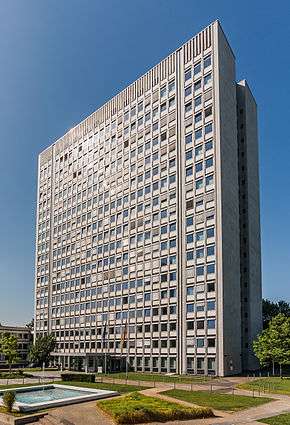Federal Network Agency
 | |
| Abbreviation | BNetzA |
|---|---|
| Formation | 1 January 1998 |
| Type | Government agency |
| Legal status | Established by Telecommunications Act 1996,[1] renamed by Federal Agency Act[2] |
| Purpose | Regulator and competition authority for privatised infrastructure. |
| Headquarters | Bonn, Germany |
Region served | Germany |
Official language | German |
President | Jochen Hohmann |
Main organ | Board |
Parent organization | German Federal Ministry of Economics and Technology |
| Website | http://www.bundesnetzagentur.de/ |
| Remarks | Established as Regulatory Authority for Telecommunications and Posts (Regulierungsbehörde für Telekommunikation und Post, RegTP) |

The Federal Network Agency (German: Bundesnetzagentur or BNetzA) is the German regulatory office for electricity, gas, telecommunications, post and railway markets. It is a federal government agency of the German Federal Ministry of Economics and Technology and headquartered in Bonn, Germany.
Responsibilities
Telecommunications
In telecommunications, the agency has the authority over the German telephone numbering plan and other technical number assignments. It also claims to regulate the telecommunication market, including termination fees and open access to subscriber lines and licenses telephone companies. Thus in return for significant license fees, just a few companies are permitted to regulate the nowadays vital area of telecommunication for both private individuals and businesses. But with barriers to entry to this lucrative market created by the high cost of licenses, only a small number of providers can enter. With competition stifled, prices and bandwidths bring huge profits for the service providers, to the disadvantage of users. The result is basic communication breakdown for those who attempt to change to a carrier offering better rates.[3] Because of this widespread failure to maintain services in terms of speed of registration and also actual communication bandwidth delivered, new laws have been passed which claim to bring clients in Germany into the same league as the rest of Europe.[4] Until January 2013 those paying for and expecting to be able to use telephones and internet were powerless when the services failed to materialise, this new law is expected to give them a voice by allowing compensation claims a legitimate backing by the highest court in Germany.
In radio communications, the Agency manages the radio frequency spectrum, licenses broadcasting transmitters and detects radio interferences. Licensing radio and TV stations (that is, content providers), however, is the task of State authorities.[5]
It is also a root certificate authority for qualified signatures according to the German Signature Act.[6]
Postal Services
The Agency's responsibility in the post market include the licensing of companies for postal services and the observation of the market. It also regulates the market, assuring non-discrimintory access to some service facilities, such as PO boxes.
Electricity and Gas
In the electricity and gas market, the Agency is responsible for ensuring non-discriminatory third-party access to networks and regulating the fees.
The Agency is not responsible for licensing energy companies. These tasks remain with authorities determined by State law.
Railway
In the area of railway traffic, the Federal Network Agency is responsible for ensuring non-discriminatory access to railway infrastructure. This includes monitoring and regulating the train schedules, allocation of railway track slots, access to service facilities, etc.[7]
The Agency is not responsible for technical supervision and licensing of railway companies. These tasks remain with the Federal Railway Office (Eisenbahn-Bundesamt, EBA).
History
In the 1990s, the telecommunications and postal services in Germany were privatized. In 1994, the Deutsche Bundespost, was privatised and split into Deutsche Post and Deutsche Telekom, which remained under the supervision of the Federal Office for Post and Telecommunications (Bundesamt für Post und Telekommunikation, BAPT). When the market was finally opened for competitors on 1 January 1998, the Regulatory Authority for Telecommunications and Posts (Regulierungsbehörde für Telekommunikation und Post, RegTP) was established, superseding the Federal Office as the supervisor for posts and telecommunications.
When the government decided to improve competition for the energy and railway markets as of 13 July 2005 and 1 January 2006, it found that the Regulatory Authority's expertise in enabling open access to telecommunication networks would also be useful in these infrastructure markets. To reflect these new competences, the authority was renamed to Federal Network Agency for Electricity, Gas, Telecommunications, Posts and Railway (Bundesnetzagentur für Elektrizität, Gas, Telekommunikation, Post und Eisenbahnen, BNetzA).
Governance
Presidents
- Klaus-Dieter Scheurle (1998–2000)
- Matthias Kurth (2001–2012)
- Jochen Homann (2012–present)
Advisory Council
The Advisory Council consists of 16 members of the German Bundestag and 16 representatives of the German Bundesrat; the Bundesrat representatives must be members or political representatives of the government of a federal state. The members and deputy members of the Advisory Council are appointed by the federal government upon the proposal of the German Bundestag and the German Bundesrat.
References
- ↑ Telekommunikationsgesetz (TKG) of 1996-07-25, BGBl. Part I, p. 1120 (in German)
- ↑ Gesetz über die Bundesnetzagentur für Elektrizität, Gas, Telekommunikation, Post und Eisenbahnen (BEGTPG) [ Act on the Federal Network Agency for Electricity, Gas, Telecommunications, Posts, and Railways] of 2005-07-07, BGBl. Part I, p. 1970, 2009 (in German)
- ↑
- ↑
- ↑ Federal Network Agency. "Tasks of the Federal Network Agency". Retrieved 2010-03-19.
- ↑ Gesetz über Rahmenbedingungen für elektronische Signaturen (Signaturgesetz – SigG) [ Act on a Legal Framework for Electronic Signatures] of 2001-05-16, BGBl. Part I, p. 876 (in German)
- ↑ http://www.bundesnetzagentur.de/enid/30d3dbe8d4543b1ec45060697b229a78,0/Areas/Railway_Regulation_29e.html